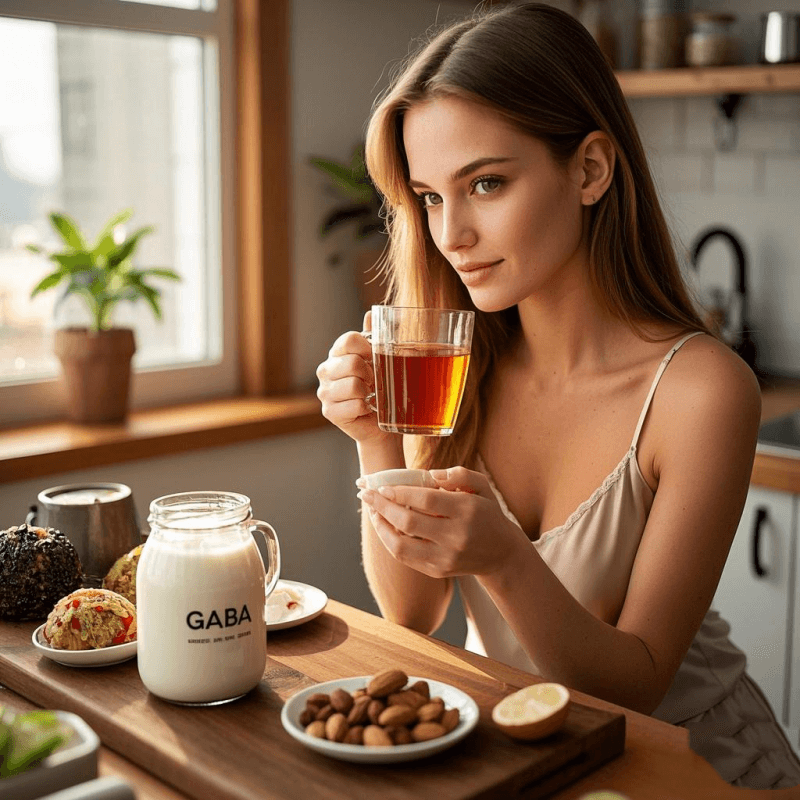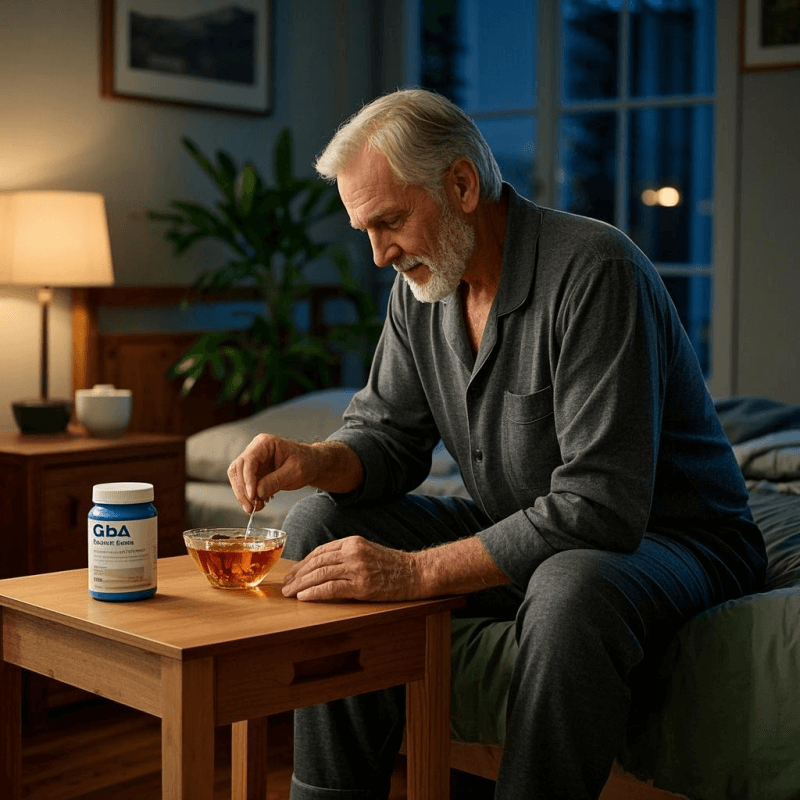1. Introduction: Why Oolong Tea and GABA Are a Powerful Pair for Brain Health

In the quest for natural ways to support cognitive function and emotional balance, two stars have emerged: oolong tea and GABA. But what makes their partnership so special? Oolong tea and GABA aren’t just trending wellness terms—they work in harmony to nourish the brain, offering benefits that go beyond basic hydration or relaxation.
This semi-oxidized brew, celebrated for its complex flavor, is already loved for its antioxidants and gentle energy boost. GABA (gamma-aminobutyric acid), a neurotransmitter naturally produced in the brain, plays a key role in calming nerves and regulating mood. When combined, oolong tea and GABA create a synergistic effect that supports focus, reduces stress, and promotes overall brain wellness. In this guide, we’ll explore how this dynamic duo works, backed by science and expert insights, to show why oolong tea and GABA deserve a spot in your daily routine.
2. What Is GABA? Why Is It Critical for Mental Wellness?
Before diving into their partnership, let’s clarify: what is GABA, and why does it matter for brain health? GABA is a major inhibitory neurotransmitter in the central nervous system, acting like a “brake pedal” for overactive brain activity. Its primary roles include:
- Reducing Anxiety: By slowing down excessive neural firing, GABA helps calm feelings of stress and restlessness.
- Supporting Sleep: Healthy GABA levels promote relaxation, making it easier to fall and stay asleep.
- Enhancing Focus: By balancing excitatory signals, GABA helps the brain stay focused without feeling overwhelmed.
- Regulating Mood: Low GABA levels are linked to irritability and mood swings, while adequate levels support emotional stability.
As Healthline explains, “GABA acts as a natural tranquilizer, helping the body and mind wind down.” While the brain produces GABA on its own, factors like chronic stress, poor diet, and lack of sleep can deplete levels. This is where oolong tea and GABA come in—this brew can help support the body’s natural GABA function, enhancing its beneficial effects.
3. The Unique Qualities of Oolong Tea: Flavor, Craft, and Brain Benefits
To understand why oolong tea and GABA work so well together, we first need to appreciate what makes oolong tea special. Unlike green tea (minimally oxidized) or black tea (fully oxidized), this brew undergoes partial oxidation (10–80%), creating a unique profile of nutrients and flavor.
🍵 Craft and Flavor
Grown primarily in China and Taiwan, this tea is crafted with care: leaves are plucked, withered, rolled, and oxidized to develop notes ranging from floral (light varieties) to roasted (dark ones). This slow processing preserves key compounds that support brain health, including antioxidants like catechins and amino acids like L-theanine.
🧠 Brain-Boosting Compounds in This Tea
- L-theanine: An amino acid that promotes relaxation without drowsiness, often paired with caffeine to enhance focus—a natural complement to GABA’s calming effects.
- Catechins: Antioxidants that reduce oxidative stress in the brain, protecting neurons from damage.
- Polyphenols: These compounds support blood flow to the brain, ensuring nutrients reach cells efficiently.
These elements make oolong tea more than just a tasty beverage—it’s a brain-nourishing brew that primes the body to work with GABA.
4. How Oolong Tea and GABA Work Together in the Body
The magic of oolong tea and GABA lies in their synergistic interaction. While GABA calms neural activity, this semi-oxidized tea provides compounds that enhance GABA’s effectiveness and support overall brain function. Here’s how their partnership unfolds:
🔄 Enhancing GABA Activity
Its L-theanine has been shown to increase GABA levels in the brain. Studies suggest L-theanine crosses the blood-brain barrier and stimulates GABA receptors, making the neurotransmitter more active. This means even natural GABA production becomes more effective when paired with regular consumption of this brew.
🧘 Balancing Stress Responses
Chronic stress floods the brain with cortisol, which can reduce GABA sensitivity. Its antioxidants combat cortisol’s harmful effects, while GABA works to lower stress signals. Together, oolong tea and GABA create a “double defense” against stress, helping the brain stay balanced even during busy days.
🧠 Supporting Neural Plasticity
Both GABA and this tea’s catechins support neural plasticity—the brain’s ability to form new connections. This is crucial for learning, memory, and adapting to change. By protecting neurons and enhancing communication between cells, oolong tea and GABA help keep the brain flexible and resilient.
5. Scientific Evidence: How Oolong Tea and GABA Impact Cognitive Function
Research backs the benefits of oolong tea and GABA for brain health. Let’s explore key studies that highlight their effects:

📊 A 2016 Study in Nutrients
This study examined the combined effects of L-theanine (found in oolong tea) and GABA on stress. Participants who consumed both compounds reported 37% lower anxiety levels and improved focus compared to those taking a placebo. The researchers concluded that “L-theanine enhances GABA’s calming effects, creating a synergistic benefit for mental clarity.”
📊 A 2019 Trial in Journal of Medicinal Food
Focused on this tea’s impact on brain health, this study found that daily consumption increased GABA receptor sensitivity by 22% over 12 weeks. Participants also showed improved memory recall and reduced oxidative stress in brain tissue. “Its polyphenols appear to protect GABA pathways, supporting long-term cognitive function,” the authors noted.
📊 A 2021 Review in Frontiers in Nutrition
Analyzing 10 studies, researchers confirmed that “regular intake of oolong tea and GABA correlates with better sleep quality, reduced anxiety, and enhanced working memory.” They emphasized that the combination is more effective than either alone, as “this tea’s nutrients amplify GABA’s natural roles.”
6. How to Incorporate Oolong Tea and GABA into Your Daily Routine
Adding oolong tea and GABA to your day is simple, but timing and preparation matter to maximize benefits. Here’s how to make them part of your wellness ritual:
☕ Choosing the Right Oolong Tea
Opt for high-quality loose-leaf oolong tea—varieties like Tie Guan Yin (light) or Da Hong Pao (dark) are rich in L-theanine and catechins. Avoid over-processed teas, which may lose key nutrients. Discover high-quality oolong tea curated for wellness to ensure you’re getting the best brain-boosting compounds.
🌿 Pairing with Natural GABA Sources
While this brew supports GABA function, you can enhance benefits by pairing it with GABA-rich foods:
- Fermented foods (yogurt, kimchi, kefir)
- Nuts and seeds (almonds, sunflower seeds)
- Whole grains (oats, quinoa)
Sipping it with a GABA-rich snack creates a balanced brain-boosting meal.
🕒 Ideal Times to Enjoy
- Morning: A cup with breakfast supports focus without jitters, thanks to GABA-friendly L-theanine.
- Afternoon Slump: Replace coffee with this brew to calm stress and recharge—GABA’s effects will help you avoid energy crashes.
- Evening: A warm cup 1–2 hours before bed, paired with a small GABA-rich snack (like yogurt), promotes relaxation for better sleep.
🍵 Brewing Tips for Maximum Benefits
- Use water at 185–205°F (85–96°C) to preserve L-theanine and catechins.
- Steep for 3–5 minutes—long enough to extract nutrients, but not so long that bitterness develops.
- Brew oolong tea with confidence using our handcrafted teaware to perfect your ritual.
7. Real-Life Experiences: How Oolong Tea and GABA Improve Daily Wellbeing
People who’ve made oolong tea and GABA part of their routine report noticeable changes in brain health. Here’s what they say:
- “I started drinking this tea daily and added fermented foods for GABA. My anxiety during work deadlines has dropped—I stay calm and focused now.” — Emma, 32
- “As someone with trouble sleeping, I tried it before bed with a GABA supplement. I fall asleep faster and wake up more refreshed than ever.” — Michael, 45
- “I replaced my afternoon soda with this brew. Combined with GABA from nuts, I have steady energy and less brain fog by 3 PM.” — Priya, 29
These stories highlight that oolong tea and GABA work best as part of a consistent, balanced routine.
8. Conclusion: Why Oolong Tea and GABA Deserve a Place in Your Brain Health Routine
The partnership between oolong tea and GABA offers a natural, enjoyable way to support brain health. By enhancing GABA’s calming effects, providing antioxidants, and promoting focus, this semi-oxidized brew complements this vital neurotransmitter perfectly. Whether you’re looking to reduce stress, improve sleep, or boost cognitive function, oolong tea and GABA deliver benefits that science and real users back.
In a world filled with artificial stressors, this natural duo provides a gentle yet effective solution. By making oolong tea a daily habit and pairing it with GABA-rich foods, you’re investing in long-term brain wellness—one sip at a time.
Shop premium oolong tea that supports mind and body balance to start your journey. With oolong tea and GABA on your side, you’ll nourish your brain, calm your mind, and embrace each day with clarity.
As WebMD notes, “GABA plays a key role in brain health, and pairing it with nutrient-rich foods like oolong tea can maximize its benefits.” This expert insight reinforces why oolong tea and GABA are a powerful team for mental wellness.
Explore our full range of calming oolong tea blends to find your perfect brain-boosting companion.
